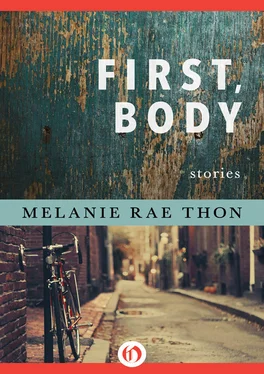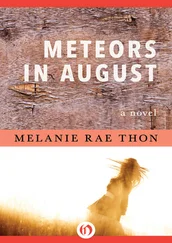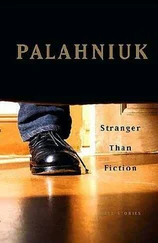Melanie Thon - First, Body - Stories
Здесь есть возможность читать онлайн «Melanie Thon - First, Body - Stories» весь текст электронной книги совершенно бесплатно (целиком полную версию без сокращений). В некоторых случаях можно слушать аудио, скачать через торрент в формате fb2 и присутствует краткое содержание. Год выпуска: 2014, Издательство: Open Road Media, Жанр: Современная проза, на английском языке. Описание произведения, (предисловие) а так же отзывы посетителей доступны на портале библиотеки ЛибКат.
- Название:First, Body: Stories
- Автор:
- Издательство:Open Road Media
- Жанр:
- Год:2014
- ISBN:нет данных
- Рейтинг книги:4 / 5. Голосов: 1
-
Избранное:Добавить в избранное
- Отзывы:
-
Ваша оценка:
- 80
- 1
- 2
- 3
- 4
- 5
First, Body: Stories: краткое содержание, описание и аннотация
Предлагаем к чтению аннотацию, описание, краткое содержание или предисловие (зависит от того, что написал сам автор книги «First, Body: Stories»). Если вы не нашли необходимую информацию о книге — напишите в комментариях, мы постараемся отыскать её.
is a testament to the breathtaking virtuosity of
-acclaimed author Melanie Rae Thon. Through nine searing works of fiction, Melanie Rae Thon looks to the people who live in the borderlands, turning a keen and compassionate eye to those marginalized by circumstance and transgression. Taking us from the cobblestone streets of Boston to a deserted Montana road, from dance halls to hospital morgues, these urgent tales careen between the faults of the body and those of the mind, exploring the irruption of the past through the present, the sudden accidents and misguided passions that make it impossible to return to the safe territory of a former life.
First, Body: Stories — читать онлайн бесплатно полную книгу (весь текст) целиком
Ниже представлен текст книги, разбитый по страницам. Система сохранения места последней прочитанной страницы, позволяет с удобством читать онлайн бесплатно книгу «First, Body: Stories», без необходимости каждый раз заново искать на чём Вы остановились. Поставьте закладку, и сможете в любой момент перейти на страницу, на которой закончили чтение.
Интервал:
Закладка:
He touched his mother too often and in the wrong way. He leaned too close, tapping her arm to be sure she was listening. He tore chicken from the bone with his teeth, left his face greasy. Everything meant something it hadn’t meant before.
She couldn’t stand it, his big hands on her. He realized now how rarely she’d touched him. He remembered her cool palm on his forehead, pushing the hair off his face. Did he have a temperature? He couldn’t remember. He felt an old slap across his mouth for a word he’d spit out once and forgotten. He remembered his mother licking her thumb and rubbing his cheek, wiping a dark smudge.
He thought of the body he couldn’t touch, then or now — her velvety, loose skin over loose flesh, soft crepe folding into loose wrinkles.
His father was the one to tell him. They were outside after dinner, more than twenty years ago, but Sid could see them still, his father and himself standing at the edge of the yard by the empty hutches. Next door, Ollie Kern spoke softly to his roses in the dark. Sid could see it killed his father to do it. He cleared his throat three times before he said, “You need to find your own place to live, son.” Sid nodded. He wanted to tell his father it was okay, he understood, he was ready. He wanted to say he forgave him — not just for this, but for everything, for not driving him across the border one day, to Vancouver, for not suggesting he stay there a few days, alone, for not saying, “It’s okay, son, if you don’t want to go.”
Sid wanted to say no one should come between a husband and a wife, not even a child, but he only nodded, like a man, and his father patted his back, like a man. He said, “I guess I should turn on the sprinkler.” And Sid said, “I’ll do it, Dad.”
They must have talked after that, many times. But in Sid’s mind this was always the last time. He remembered forever crawling under the prickly juniper bushes to turn on the spigot as the last thing he did for his father. Remembered forever how they stood, silent in the dark, listening to water hitting leaves and grass.
He was in the living room now with his mother, after all these years, drinking instant coffee made from a little packet — it was all she had. It was still so hot. She said it. It’s still so hot . It was almost dark, but they hadn’t turned on the lights because of the heat, so it was easy for Sid to imagine the shadow of his father’s shape in the chair, easy to believe that now might have been the time his father said at last, Tell me, son, how it was, the truth, tell me . It was like this. Think of the meanest boy you knew in sixth grade, the one who caught cats to cut off their tails. It’s like that. But not all the time. Keep remembering your eleven-year-old self, your unbearable boy energy, how you sat in the classroom hour after hour, day after day, looking out the window at light, at rain. Remember the quivering leaves, how you felt them moving in your own body when you were a boy — it’s like that, the waiting, the terrible boredom, the longing for something to happen, anything , so you hate the boy with the cat but you’re thrilled too, and then you hate yourself, and then you hate the cat for its ridiculous howling and you’re glad when it runs into the street crazy with pain — you’re glad when the car hits it, smashes it flat. Then the bell rings, recess is over, and you’re in the room again — you’re taking your pencils out of your little wooden desk. The girl in front of you has long, shiny braids you know you’ll never touch, not now, not after what you’ve seen, and then you imagine the braids in your hands, limp as cats’ tails, and Mrs. Richards is saying the words stifle, release, mourn , and you’re supposed to spell them, print them on the blank page, pass the paper forward, and later you’re supposed to think the red marks — her sharp corrections, her grade — matter.
He could be more specific. If his father wanted to know. At night, you dig a hole in red clay and sleep in the ground. Then there’s rain. Sheets and rivers and days of rain. The country turns to mud and smells of shit. A tiny cut on your toe festers and swells, opens wider and wider, oozes and stinks, an ulcer, a hole. You think about your foot all the time, more than you think about your mother, your father, minute after minute, the pain there, you care about your foot more than your life — you could lose it, your right big toe, leave it here, in this mud, your foot, your leg, and you wonder, how many pieces of yourself can you leave behind and still be called yourself? Mother, father, sister — heart, hand, leg. One mosquito’s trapped under your net. You’ve used repellent — you’re sticky with it, poisoned by it — but she finds the places you’ve missed: behind your ear, between your fingers. There’s a sweet place up your sleeve, under your arm. And you think, This is the wound that will kill me . She’s threading a parasite into your veins. These are the enemies: mud, rain, rot, mosquito. She’s graceful. She’s not malicious. She has no brain, no intentions. She wants to live, that’s all. If she finds you, she’ll have you. She buzzes at your head, but when she slips inside there’s no sound.
It’s still so hot . He wants to bang the keys of the out-of-tune piano. He wants a racket here, in his mother’s house. He longs for all the dark noise of Roxanne, his plates with their tiny roses smashing to the floor two nights ago, his blue glasses flying out of the drainer. She wanted a drink, and he said she could have one, and she told him to fuck himself, and then the dishes exploded. He thinks of her walking through the broken glass, barefoot but not cutting her feet, brilliant Roxanne. Roxanne Roxanne . He has to say her name here, now, bring her into this room where the silent television flickers like a small fire in the corner. He wants to walk her up the stairs to that boy’s room, wants her to run her fingers through the silky fur of rabbit pelts in the closet, wants to explain how fast his father was with the knife but too old, too slow, to collect tolls for the ferry. He wants to show her the tight corners of the white sheets, wants her to touch him, here, in this room, to bring him back together, who he was then, who he is now.
So he is saying it, her name. He is telling his mother, I’ve been seeing someone , and his mother is saying, That’s nice, Sid — you should bring her to dinner , and he understands she means sometime, in some future she can’t yet imagine, but he says, Next week ?
She sips at her too-hot coffee, burns her pursed lips, says, Fine, that would be fine .
Roxanne will never agree to it. He knows this. He sees the glow of her cigarette moving in the dark, hand to mouth. He knows he won’t ask because he can’t bear the bark of her laughter. He doesn’t turn on the light, doesn’t speak. He sees what’s happening, what will happen — this room in winter, the gray light leaking across the floor, the windows closed, the rain streaming down the glass.
He lies down beside her. She stubs out her cigarette, doesn’t light another, says nothing but moves closer, so the hair of her arm brushes the hair of his.
He knows she hasn’t eaten tonight, hasn’t moved all day, living on cigarettes and air, a glass of orange juice he brought her hours ago. Roxanne. But she must have stood at the windows once while he was gone, he sees that now: the blinds are down; the darkness is complete, final, the heat close. There’s only sound: a ship’s horn on the canal; a man in the distance who wails and stops, wails and stops, turning himself into a siren. She rolls toward him, touches his lips with her tongue, presses her frail, naked body against him. He feels the bones of her back with his fingers, each disk of the spine. He knows he can’t say anything — now or forever — such tender kisses, but he’s afraid she’ll stop, that she’ll break him here, on this bed, so he holds back, in case she says she’s tired or hungry, too hot, though he’s shaking already, weeks of wanting her pulled into this moment. He touches her as if for the first time, each finger forming a question: Here and here, and this way, can I ? He’s trembling against his own skin, inside. If she says no, he’ll shatter, break through himself, explode. She’s unbuttoning his shirt, unzipping his pants, peeling him open. She’s tugging his trousers down toward his feet but not off — they shackle him. And he knows if they make love this way, without talking, it will be the last time. He wants to grab her wrists and speak, but he can’t — the silence is everything, hope and the lack of it. He wants the dark to come inside him, to be him, and there are no words even now, no sounds of pleasure, no soft murmurs, no names, no gods, only their skin — hot, blurred — their damp skin and the place where his becomes hers no longer clear, only her hair in his mouth, her eyes, her nose, her mouth in his mouth, her nipple, her fingers, her tongue in his mouth, brittle Roxanne going soft now, skinny Roxanne huge in the heat of them, swollen around him, her body big enough for all of him and he’s down in her, all the way down in the dark and she has no edges, no outline, no place where her dark becomes the other dark, the thinning, separate air, and he doesn’t know his own arms, his own legs, and still he keeps moving into her, deeper and deeper, feeling too late what she is, what she’s become, softer and softer under him, the ground, the black mud, the swamp swallowing him — he’s there, in that place, trying to pull himself out of it, but his boots are full of mud — he’s thigh-deep, falling face down in the swamp, and then he feels fingernails digging into his back, a bony hand clutching his balls. He tries to grab her wrist but she’s let go — she’s slipped away from him, and he knows he never had a chance — this swamp takes everyone. He’s gasping, mouth full of mud, and then there’s a word, a name, a plea: Stop, Sid, please , and then there’s a body beneath him, and then there’s his body: heavy, slick with sweat, and then there’s a man sitting on the edge of a mattress, his head in his hands, and then there’s the air, surprising and cool, the fan beating and beating.
Читать дальшеИнтервал:
Закладка:
Похожие книги на «First, Body: Stories»
Представляем Вашему вниманию похожие книги на «First, Body: Stories» списком для выбора. Мы отобрали схожую по названию и смыслу литературу в надежде предоставить читателям больше вариантов отыскать новые, интересные, ещё непрочитанные произведения.
Обсуждение, отзывы о книге «First, Body: Stories» и просто собственные мнения читателей. Оставьте ваши комментарии, напишите, что Вы думаете о произведении, его смысле или главных героях. Укажите что конкретно понравилось, а что нет, и почему Вы так считаете.











